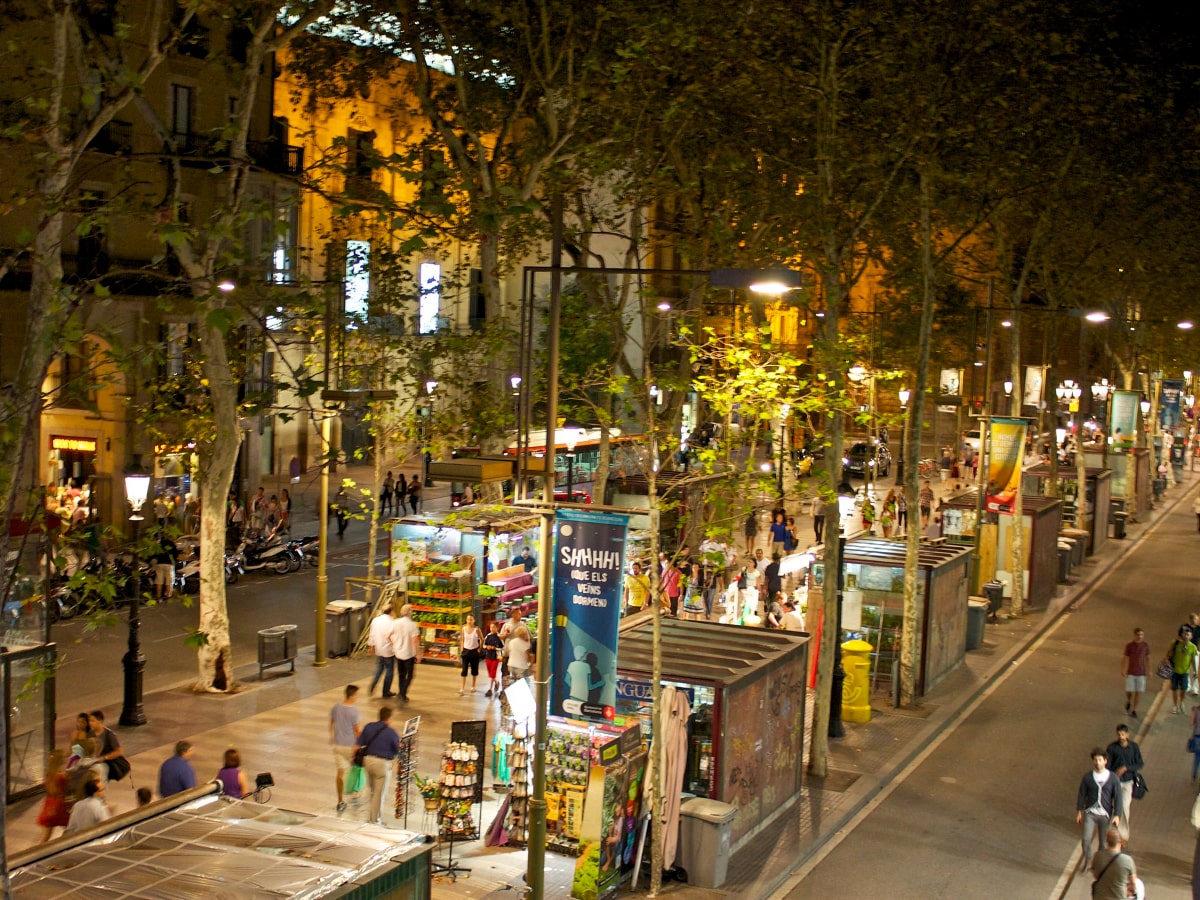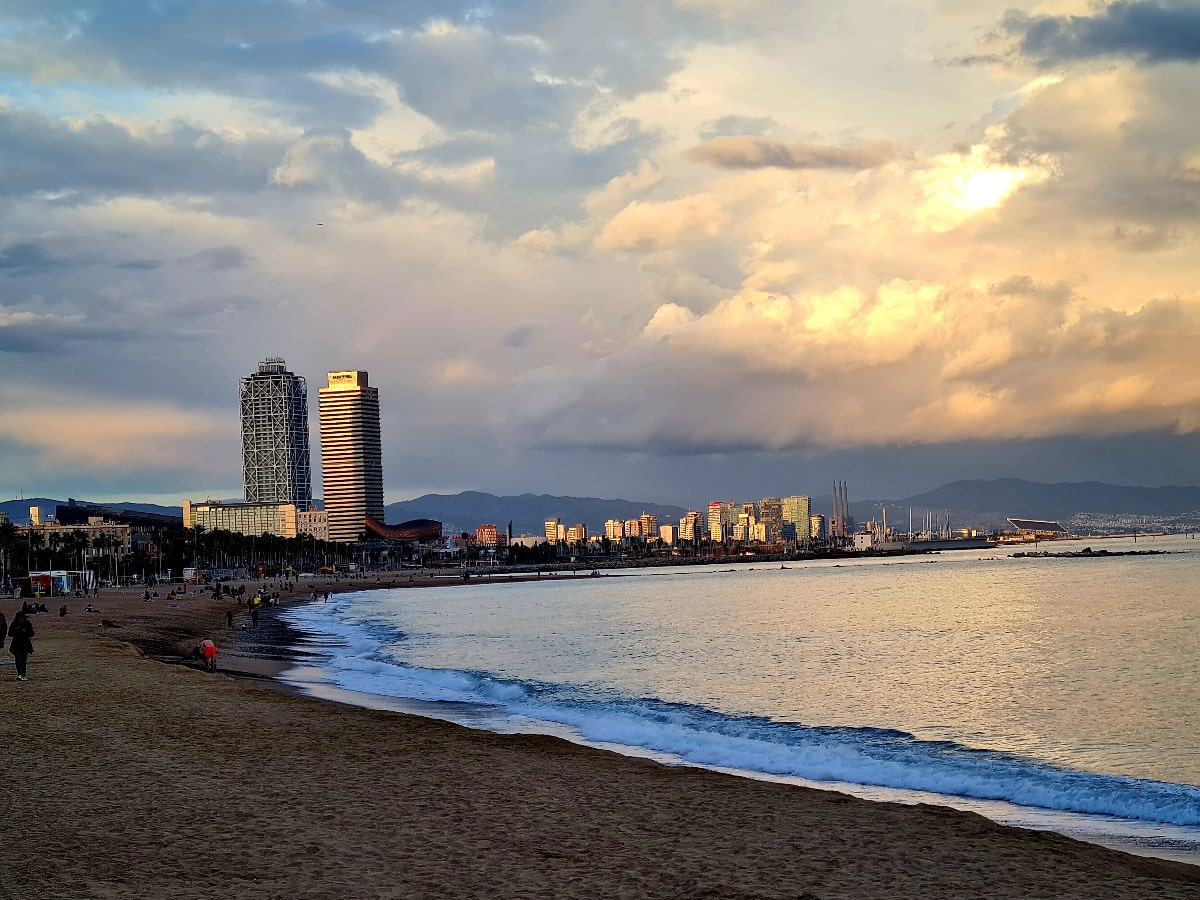Living in Barcelona is a dream for many people. One of Europe’s most famous cities and most popular travel destinations, the Catalan capital has long drawn in foreigners looking to experience it for themselves whether that’s for just a few months or a longer period. However like many global cities, the reality of the Barcelona lifestyle doesn’t always match the high expectations people have. In this post we’ll look at some of the pros and cons to Barcelona life and also detail the cost of living there.
Table of Contents
- Living in Barcelona Pros and Cons
- Cost of Living in Barcelona
Living in Barcelona Pros and Cons
Good things about life in Barcelona
Let’s start with the positives and there are many great things about living in Barcelona and it’s not hard to see why it remains so popular.
International vibes
One of the best things about Barcelona life for expats and immigrants is the large number of international communities that exist. There are people from all four corners of the world and a wide range of events through the week (at least when there’s not a pandemic going on) that will enable you to meet people from other countries. If you’ve made the leap to live in another country, chances are you will see that as a positive thing.
Meetup is a good place to go looking for groups and events while there are also a large number of language schools which also provide an opportunity to mix with an international crowd. Overall, Barcelona is certainly the best city in Spain in terms of having a truly diverse international atmosphere given many of the other coastal cities with large expat communities tend to be full of people from just a few other European countries.
It’s a beautiful city
With its world famous Gaudi architecture, pretty parks and beaches, there’s no doubt that Barcelona is a beautiful city to live in and its special charms shouldn’t wear off, no matter how long you stay.
You will struggle to find a more spectacular coastal city in Europe and while like anywhere, there are some fairly uninspiring suburbs, Barcelona also has many enchanting neighbourhoods to choose from when it comes to choosing where to live.
Compact size with good transport links
Barcelona has the best of both worlds in terms of its size. While it is the second largest Spanish city and 10th largest in the EU in terms of population, the area it covers is actually relatively small. While that does make it quite a crowded place at times, it makes getting around quite simple and if you live somewhere central, you can mostly get around on foot.
While the buses can be slowed down by heavy traffic, the Barcelona metro network consists of 12 lines and there is virtually nowhere in the city proper which isn’t accessible by it.
Nature – easy access to beaches & mountains

While Barcelona does have many popular beaches, these can get very busy and there are nicer ones located outside of the city. Many of the nearby beaches are easily and affordably reached via the Rodalies de Catalunya trains with popular ones such as Castelldefels and Montgat accessible in only around half an hour from Central Barcelona.
The city is also quite close to the mountains too. The most famous within easy reach of the city is the Montserrat Mountain Range with peaks of over 1 km above sea level while the Pyrenees are also not too far away for those looking for a bigger challenge.
Wide range of bars & restaurants
In terms of evening entertainment, Barcelona can compete with just about any city in Europe in terms of its range of bars, clubs and restaurants. While you do need to be a bit selective to avoid being stung in the tourist traps, you are spoiled for choice with some excellent options no matter what your idea of a good night out is.
While there are better places to go in Spain for local cuisine, Barcelona’s range of international offerings trumps any other Spanish city with people from all around the world having settled here and opened up restaurants.
Bad things about living in Barcelona
Now for some of the bad things about daily life in Barcelona. While many of these are common in just about any popular city that attracts large numbers of visitors, they are factors to at least be aware of before jumping on a plane and committing to living in the Catalan capital.
Mass tourism
It’s no secret that Barcelona is one of the most popular destinations for a city break or short trip in the world. While you’d have thought that having a lot of visitors is a good thing for any city, the sheer volume of tourists that flock to Barcelona every weekend has become a real issue. Tourism has even been described as “the number one problem for the city”.
That’s because Barcelona simply doesn’t have much room to grow outwards given the natural barriers that surround it and the rise of tourist accommodation has led to a vastly inflated local market making it harder and harder for locals (or anyone moving to the city) to find affordable, longer term options. The Covid-19 pandemic may have temporarily eased this issue but once travel restrictions across the world ease, it seems inevitable that Barcelona’s streets and plazas will be chock-a-block with visitors again.
Tourist prices & treatment

Those issues surrounding too many tourists harming life in Barcelona for local people, can spill over to feelings of resentment towards foreign people in general. While it’s only a minority, that can make life a bit uncomfortable at times for people from other countries living in the city as somewhat unfairly if you don’t look local, many Catalans will assume you are a tourist and treat you as such.
There are also certain areas, particularly around La Rambla, Plaça de Catalunya and Barceloneta where you’ll also expect to pay way above the normal going rate for a meal or drink. While there is the odd gem in these areas, you’ll quickly learn to avoid the tourist places once you’ve spent a bit of time in the city.
There are many friendlier cities in Spain
Barcelona is also arguably one of the least friendly cities in Spain to live in. It is a slightly more serious, work-orientated place in many respects than cities in other parts of the country which tend to be more relaxed and where people in general are a bit more open.
That can make it a bit harder to get to know locals in Barcelona than in Madrid, Seville or other major Spanish cities. However the level of English in Barcelona is perhaps slightly higher in general so if you don’t speak Spanish, that barrier isn’t quite so great as it might be elsewhere.
Political instability
Another issue, you at least need to keep an eye on, is the current political climate in Barcelona and Catalonia in general. In 2017, there was an independence referendum which wasn’t recognised by Spain which resulted in the Spanish government arresting a number of the Catalan independence leaders and reintroducing direct rule from Madrid.
Four years on, the issue may have largely disappeared from the international news but it hasn’t gone away. Earlier in 2021, Catalan regional elections saw pro-independence parties win over 50% of the vote for the first time and there have also been violent clashes in Barcelona already this year following the imprisonment of a prominent Catalan rapper.
While this political instability shouldn’t in the short-term have a major impact on your life in the city, should the situation escalate that may change so it’s certainly something to at least educate yourself on and keep tabs of the latest developments.
Petty Crime
Petty crime and pickpockets exist in just above every major city in the world but Barcelona does have a particularly bad reputation for it. This is largely targeted at tourists so you can mostly avoid it by not acting like one. Walking around obviously drunk in the main central districts risks making you a target for example, as may flashing expensive electronic items.
If you are sensible and don’t spend much time in those areas, particularly at night, there’s no reason why you can’t have a completely safe time in Barcelona. However the number of slightly unsavoury characters who hang around La Rambla and the old central neighbourhoods is certainly a negative aspect to life in what overall is a great city.
Cost of Living in Barcelona
Here are a few typical sample costs for anyone living in or planning to move to Barcelona:
| Living in Barcelona | Cost |
| Room in a 3-4 bedroom apartment | 350-500 Euros/month |
| Private 1 bedroom apartment | 700-900 Euros/month |
| Small studio apartment | 600-750 Euros/month |
| Wifi in home | 30-50 Euros/month |
| Utilities (Electricity/Heating/Water) in fully occupied 3/4 bedroom apartment | 100-200 Euros |
| Meal in an affordable restaurant | 10-15 Euros |
| 0.5 litre beer in a bar/restaurant | 2-4 Euros |
| Litre of milk in supermarket | 0.70-1 Euros |
| 3 kg of potatoes | 3-5 Euros |
| Monthly metro pass | 40 Euros |
| Gym monthly fee | 30-60 Euros |
Overall, Barcelona is certainly one of the most expensive cities to live in Spain. Costs are roughly in line with Madrid but still much cheaper than other popular European cities such as London or Paris.
The cost of living in Barcelona will clearly depend on your circumstances and lifestyle though. There are many tempting ways to spend your money so sticking to a budget can be trickier here than elsewhere. Living in Barcelona as a student in a flatshare, it should be possible to get by on 1000 Euros per month if you’re relatively sensible in terms of how you spend your money. You can still enjoy an active social life and party a lot without spending very much, providing you do a lot of your drinking at home or at house parties rather than in Barcelona’s expensive night clubs.
Those looking for a private apartment and a bit more luxury may want to stretch their budget to something more like 1300-1500 Euros per month.
This article was published in March 2021. You can find updated living costs for Europe in 2023 here which includes data on Barcelona and Spain.

